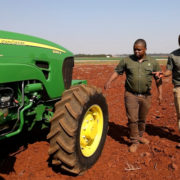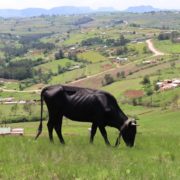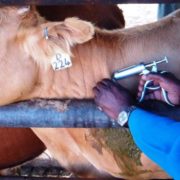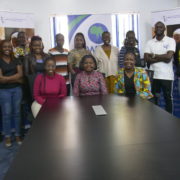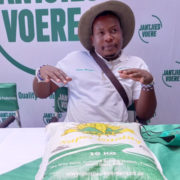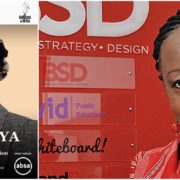It’s time to develop a powerful personal brand — Lionesses of Africa

by Lori Milner
“A brand for a product is like a reputation for a person” – Jeff Bezos
Why do brands spend what they do on advertising and marketing? Of course it’s the obvious essentials like profit and growth, creating social impact but really it comes down to creating loyal fans. It’s the same with your personal brand.
Your brand is not something you say about yourself, it’s what others say about you. When you think of the word fan, you picture screaming admirers at a music concert. Not at all. I am a fan of certain authors because their work really resonates with me. When they launch a new book on pre-order, I will download it without knowing the details because I know I am going to receive value. That’s a fan.
Your fans are people who are prepared to recommend you for new opportunities and roles, also known as sponsors. Think about the mafia movies like the Godfather where the line ‘he’s one of us’ means he vouches for you. He has put his reputation on the line and the mutual expectation is that you will deliver.
This kind of a trust is a gift and has to be earned over time through your daily actions. Perhaps you have never really thought about your brand up to now or you have changed roles from marketing to sales and don’t want to be associated with your prior position. Here are some things to consider when it comes to your personal ‘brand’ campaign and creating a genuine following of loyal fans:
Your brand attributes must be on every product
“Your brand is a gateway to your true work. You know you are here to do something – to create something or help others in some way. The question is, how can you set up your life and work so that you can do it? The answer lies in your brand. When you create a compelling brand you attract people who want the promise of your brand – which you deliver” – Dave Buck
When you buy a pair of Nike shoes, there are certain elements you expect from every pair irrespective of the model. The logo, comfort, style, quality, etc. For Starbucks, you expect convenient locations, friendly service, a quality product and consistent packaging. These aren’t nice to haves; these form the basics of what you assume will be part of your experience. You aren’t blown away because your packaging is protective and locks in the freshness, flavour, aroma, and unique notes that make each coffee blend distinct. This is what you expect in exchange for your money.
What are the non-negotiables on your brand’s products and deliverables?
Imagine every channel you deliver your unique service has a giant ‘brand you’ stamp on it. Every time you hand in a proposal, make a phone call, present in a meeting, send an email or deliver your service – you are attaching your attributes to it. You are making a declaration of who you are and what others can expect of you.
Every time I deliver a presentation, my attributes are solid content, passion, preparation, professionalism, an enjoyable visual presentation and I don’t use notes.
When you need to send an email or submit a document, don’t see it as just another email. Have you been thoughtful about content, spelling, relevance, tone and time of day you are sending it? It’s a representation of the quality they can expect from you; so what message are you sending out there?
Consistency is key
“People like consistency. Whether it’s a store or a restaurant, they want to come in and see what you are famous for.” – Millard Drexler
Think about your favourite coffee, food or restaurant brand. It delivers the same product every time which is why it is your ‘old faithful’ that you keep coming back to. It delivers the same experience without fail. A Starbucks will always taste like Starbucks, if it started to differ in service and experience, you would start to question where you spend your money. A lack of consistency will break your trust with the brand, it will disappoint you and eventually you will look for an alternative.
It’s the same with you. It’s not enough to know your brand attributes, it’s about consistent delivery. You can’t show up with no preparation every second meeting or write sloppy emails on some days because you were rushing to get it out. If you start to let people down, you will definitely not be considered when a big promotion or opportunity presents itself because the image you have created is someone who is unreliable and inconsistent.
This isn’t just about service delivery or emails but consider an element like being punctual. If you start to show up even 10 minutes late for every online meeting, you will start to be associated with words like undependable, erratic or you have an inability to plan. It goes further than just the status meeting; people will question if they can trust you with their clients and the bigger projects if you can’t be bothered to put your commitment into the smaller things.
What problem do you solve?
“When you look at people who are successful, you will find that they aren’t the people who are motivated but have consistency in their motivation.” – Arsene Wenger
Warby Parker provides affordable stylish sunglasses, Netflix is entertainment on demand and great variety. What problem do you solve? This may seem hard to differentiate if you’re in a team of like-minded professionals where it feels hard to distinguish your unique skills. We often under estimate that something special we bring to others. Think about what is your exceptional super power?
Ask your team what would be missing if you weren’t in the office that day or on the daily catch up online. The kind of traits that come up in my workshops include ‘a sounding board, a diffuser of tension, humour, keep the team focused, a great organiser, the calm in the chaos, the maternal role where everyone can download safely’.
Ask yourself ‘am I bringing my full self to my professional journey’? Why or why not? Pay attention to what you can start to bring forth that you may have been minimizing.
Don’t think you need one version for personal life and one version of yourself for work life. Be authentic and make sure you are demonstrating and owning your individuality.
Apart from your personal super power that is core to your brand, you also need to consider the bigger problem you solve. Why you do what you do – how do you contribute?
Are you spending the majority of your day doing other people’s urgent work or attending to mindless email? Or…
Are you spending the majority of your day doing what you are world class at?
That is how you energise yourself from the inside out, when you are spending your time on the areas where you are successful and you can bring your unique ‘brand you’ stamp to. Don’t get lost in the busyness of everyone else’s failure to plan or your inability to say no to useless tasks for fear of conflict.
Structure your day so you can demonstrate the problem you solve and let your brand shine.
What’s your brand promise?
“Your personal brand is a promise to your clients… a promise of quality, consistency, competency, and reliability” – Jason Hartman
Your brand is the promise you make. Another way to think about it is what do people expect from you when they engage with you? Brands that keep their promises are consistent and trustworthy. It is the essence of what you want to stand for and your brand is the means to communicate how you want to show up in the world.
Companies that have successfully positioned their brand own a specific word and promise in a consumer’s mind. “Honda is ‘reliability,’ Mercedes is ‘luxury,’ Volvo is ‘safety,’ BMW is ‘performance’ and Tesla is ‘innovative.’ Nike’s brand promise is “to bring inspiration and innovation to every athlete in the world.”
Starbuck’s brand promise is “to inspire and nurture the human spirit – one person, one cup and one neighbourhood at a time.” All these brands demonstrate this promise through delivering a consistent experience across multiple touch points.
What words do you want to own? In other words, when people think about you, what do you want them to associate with you? Do you want people to see you as reliable, creative, trustworthy, consistent, ambitious?
Now ask yourself – what are you doing to demonstrate this every day? It’s not enough to know how you want to position yourself, it is the daily actions that communicate your promise. What does reliable mean practically? Are you getting back to people on time? Do you respond to messages timeously? Do you procrastinate and put people under pressure due to a lack of planning?
The product is always going to be the hero. When you go to a restaurant, you may be tempted because of the beautiful and elaborate décor. The bottom line is the food needs to taste good for you to come back and recommend it to others.
Don’t get caught up in the wrong stuff like a fancy business card, website or title – are you delivering on your promise? Are you showing up?
Are you taking the responsibility of CEO?
“It takes 20 years to build a reputation and five minutes to ruin it. If you think about that, you’ll do things differently” – Warren Buffett
In an interview on MasterClass, Howard Shultz, CEO of Starbucks said, “Under pressure to deliver profitability brands can be put at risk and this is a huge mistake. In doing so long term value is typically destroyed”.
By CEO I don’t mean Chief Executive Offer but rather Chief Energy Officer. As Howard Shultz points out, making harsh decisions without considering the long term view will sabotage a brand in the long run. Typically, these are reactive decisions like cost cutting which are hard to recover from when the dust settles.
It’s the same with you. When you first went into lockdown, you were in panic and react mode. Your logged longer and more intense hours just to cope with the new challenges. You sacrificed sleep for work and lived on coffee just to get you through the day. What you don’t want to do is potentially destroy the long term value of your brand by this continued behaviour.
Mental and physical fatigue will result in you dropping the ball and making careless mistakes due to exhaustion. You may justify the behaviour saying it’s the only way to cope with the current circumstances but you need to take into the account the potential long term damage of your brand.
As in the world of product brands, you are only as good as your last experience. It works both ways. If you continually let people down, send sloppy work and put others into panic mode because of your inability to plan, you will potentially sabotage everything you have worked so hard to build up to this point. Even if your intention is to show your team and leaders that you can work 16 hour days, it is not going to have the intended results you are hoping for.
Most importantly, this is not just about managing other people’s perceptions and being best in class at work. This is about the longer term consequences for you personally. You need to take the role of Chief Energy Officer seriously, it isn’t a luxury to take time off to meditate, sleep, exercise and just be still. This is central to how you show up; you can’t possibly be at your best when overwhelm, stress and exhaustion are taking over and affecting your ability to perform.
If you can communicate openly to your team that you need to take a break between certain hours or not respond to weekend emails because its taking away downtime and family time, they will respect you more.
By making space for your recovery time, you are demonstrating self-leadership and the ability to manage your time in a constructive way and deliver quality outputs. This is how you build real trust.
Take a step back and assess what needs to change before you do irreparable damage not only to your reputation but to yourself.
Create emotional bonds
“I’ve learned that people will forget what you said, people will forget what you did, but people will never forget how you made them feel.” – Maya Angelou
A powerful brand does more than tick the box of providing a product or service. Brands that create emotional bonds are the ones we are willing to wait in lines for hours when a new product is launched, it is a book we will pre-order months in advance because we know the value it will provide.
Let’s make this personal. When I say ‘Manchester United, Chelsea, Liverpool, FC Barcelona or Tottenham Hotspur’ what comes to mind? When your team falls, you have the worst day. When they win, you are on top of the world. You are screaming at the TV when someone fumbles and their pain is your pain. This is the power of brands and the emotional bonds they form with us.
What can you do to create connection with others? Your tools are active listening and giving someone your complete focus and attention. Have you had the experience of sharing something with someone and they were looking up in between checking their mails and messages? How did it make you feel? Quite understandably annoyed and resentful.
Do not under estimate the power of giving someone the opportunity to be listened to. When we are not heard, we feel invisible. To truly listen means having the intention to understand what the person is saying, not waiting for your turn to speak and interject with your own experience or one up the other person.
Often all someone wants is the opportunity to express what’s on their mind. If they don’t ask you for a solution, don’t offer one. Not everybody wants you to fix their problem, just the opportunity to vent, share and be seen.
Emotion is how you will be remembered and this is the key to establishing yourself as a powerful personal brand.
What are your brand values?
“Marketing is about values. It’s a complicated and noisy world, and we’re not going to get a chance to get people to remember much about us. No company is. So we have to be clear about what we want them to know about us.”
– Steve Jobs
Apple’s core values are about sleek design, simplicity and innovation. Amazon’s core values include customer obsession, ownership, think big, bias for action, earn trust of others and deliver results.
These aren’t just words they put on posters around the offices, they live them daily. A value without action is an empty promise. Execution is everything to bring the values alive. This is manifested in every brand touch point, channel and the overall customer experience.
Our value system is manifested in our habit patterns.
What do you value on a personal level? If you value spirituality, you probably have a ritual of prayer or attending a religious service. If you value vitality, you will have a regular exercise practice.
It’s not enough to value being a lifelong learner, where have you dedicated time daily to read or do an online course? You may value mindfulness but when did you last sit down to meditate or take a break? How you schedule your day is how you spend your life.
If you wrote down you want to be associated with being trustworthy, reliable and dynamic – what are you doing to demonstrate it? Have you scheduled time in your calendar to translate these values into action?
When you live the values, you begin to live your authentic self and that is the basis for a powerful personal brand. In the words of Seth Godin:
“We call a brand or a person authentic when they’re consistent, when they act the same way whether or not someone is looking. Someone is authentic when their actions are in alignment with what they promise.
Showing up as a pro.
Keeping promises.
Even when you don’t feel like it.
Especially when you don’t.”
Make your mess your message
“Authenticity is consistent emotional labour” – Seth Godin
You may have the same qualifications or career path as other people but it is your bespoke life experience that makes you an authentic brand. Vulnerability is something you need to consider adding to your branding repertoire . Vulnerability is about being courageous and folding back the curtain to reveal the real you, not the face you think you need to wear to work.
When you own your setbacks and challenges, they lose all power they hold over you. When you can call the white elephant in the room, people stop focusing on it. You have diffused all the tension. For example, I am 39 years old but look a lot younger. I know most women think it’s a blessing but it has been a challenge and I have had to work a lot harder to prove myself. When I start a talk, I always make a joke of it and make a point to say what others are thinking. Now it’s dealt with and out the way.
Some instances it’s not so trivial such as being dyslexic. This is something a lot of adults struggle with and of course it can affect your confidence with written communication. Instead of creating internal struggles for yourself and trying to over compensate, make your mess your message and share it. Be completely transparent and let your team know that you prefer voice messages rather than text. Can they call you as opposed to lengthy emails. Once you can be yourself and be open about where you’re at, people can support you. I am sure they will share their stories of people they know and express similar experiences.
During this time, many companies have started mental health committees to help people deal with the mental strain Covid has brought. They have been championed by internal employees who have volunteered to share their own stories of depression, burnout and anxiety. Some people have histories of addiction and have come forward to share their experiences to create a safe space for others to share and make the conversation safe.
Covid has humanised our working world, we see people with their kids, pets and home life. We can’t pretend they don’t exist and can’t always avoid a tantrum happening in the middle of an important presentation. We accept it and don’t judge others; we smile with an empathy and compassion.
You need to adopt the same view for your personal brand. Have self-compassion and reframe how you see your setbacks and find the gift in the experience. How have you grown as a result? What messages can you share that can empower others? Make your mess your message.
Own your Mistakes
“Experience is simply the name we give our mistakes.” – Oscar Wilde
If you want to be an influential brand and build trust – own your mistakes. When something happens, don’t hide behind email or text messages. Pick up the phone and let your customers or team know you are sincerely sorry. Set up a face to face meeting so your non-verbal’s can speak louder than your words.
Even if you don’t have a solution, people want to know that they matter. Tell them you will follow up on the hour until you do have a solution. You can’t control everything and often you’re relying on other people or external factors to perform your role. It’s how you respond and take accountability that will enable you to come out as a trustworthy brand.
Have you ever had a bad dining experience and the manager came out to apologise directly? They then threw in a complimentary dessert on top of comping the entire bill. You leave that restaurant as a fan because of how they managed the situation. This is probably a story you have shared with friends and sung their praises for how they managed their errors. Don’t be scared of mistakes. Own them and you will forever be a credible brand and even convert them to fans as a result.
Conclusion
“A great brand is a story that’s never completely told”- Scott Bedbury
Building a personal brand doesn’t come with an end date. It’s not like we can ever reach a certain standard or milestone and then we can stop working on it.
The core of building a personal brand begins with self-awareness and intention. If you aren’t sure where to start, think about 5 words you want to be known for. Then make a list of how to translate those attributes into specific actions.
Be mindful that every touch point is an opportunity to showcase who you really are and how you can provide value.
If you are feeling like you haven’t done a great job up to now, the good news is that you can always behave your way into the person you want to become. When is the best time to begin? Today.
Here’s to owning your brand,
Warm wishes
Lori


